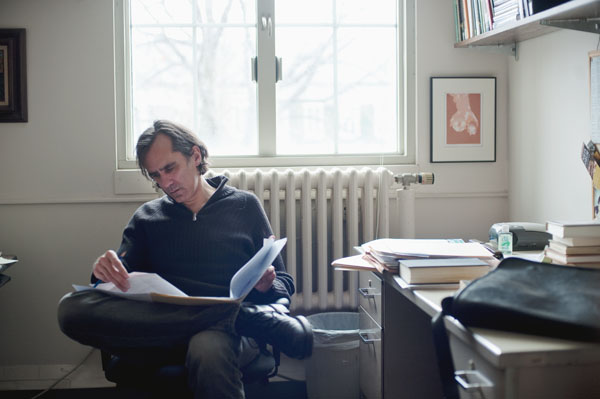4th Annual Poetry Month 30/30/30 :: Day 4 :: Lawrence Kaplun on James Longenbach

In her book of essays Proofs and Theories, Louise Gluck writes, “The argument for completion, for thoroughness, for exhaustive detail, is that it makes an art more potent because more exact – a closer recreation of the real. But the cult of exhaustive detail, of data, needs scrutiny. News stories are detailed. But they don’t seem, at least to me, at all real. Their thoroughness is a reprimand to imagination; and yet they don’t say this is what it was to be here.”
This idea feels aligned with James Longenbach’s The Iron Key and its investment in plainness, ordinary music, and the imagination. There’s no excess in these poems. But why should the reader care about lines such as: “to climb the stairs I lift my right foot higher / than my left, then lift my left foot / twice as high”?
Longenbach makes the reader think of what’s not in the poem, of the life it has off the page, and in our own imaginations. “Little Song” ends with, “They wrap you in a blanket. Then you taste food” and begins with, “It’s hard to climb the stairs at night….” His work is contemplating detail, movement in the poem, and if that movement needs to stem from detail, or if there’s enough trust in the reader to include anything, which also means just the right amount.
I have to confess that I didn’t much care for his poems the first time around, after a friend suggested I read the book. I found it subtle and, at times, boring, and thought the work lacked curiosity in its narrative. But there are so many ways to say “this is what it was to be here.” As a poet and scholar, Longenbach is probably capable of writing poems with more detail and complexity – but is that what ultimately makes for a strong poem?
His poems come from a trust in the line, an active attentiveness, and I think, a personal distance in the history with which he’s wrestling. One line makes a connection with the next because of what’s possible. I hesitate to call the transitions in Longenbach’s poems “leaps,” though they are in the sense that there’s often motion. The empty spaces in the poems (and in the layout of the book’s pages) are their own lines. He puts faith in the reader who trusts the poem, and not one who merely seeks understanding. The poems are more interested in being present with an experience or memory, and ask the reader to do the same. Longenbach asks how a poet can deeply meditate on what haunts us; in its silences, the poem itself is capable of reflection and investigation of the mind, too.
The second half of “Night Fantasies” ends as such:
[box]
Once we bought wine with a bag of pennies,
Drank it on the island, traffic swirling past on either side.
Pollini playing Stockhausen,
Paul Jacobs playing Elliot Carter.
After the premiere of Night Fantasies
We walked across the park to the apartment.
You lowered the venetian blinds,
Then pulled your jeans off
Purposefully, without shyness,
The fans of the Gargantuan rumbling below.
Augie’s, the Mill, the sewer grate where you dropped your keys—
Carter turned one hundred on December 11, 2008,
Jacobs died of AIDS in 1983.
Of all the recordings of Night Fantasies
I like the one by Jacobs best;
It sounds like Schumann, flighty, lyrical.
It’s out of print but you can listen to him playing
Busoni’s transcription of Brahms’ last work,
The organ chorale preludes, opus 122.
Arbiter Records, B0004W1KS.
[/box]
Longenbach’s poems have become lessons in craft for me, in how to make poems with less while still retaining emotional power. His work gives validation to ordinary speech and I think also, the risk of plainness – that a poem can make layers and complicate through its inherent simplicity. These poems employ scrutiny and detail while also being aware of time, and taking solace in the elegance of the unsaid.
[line]
[line]
[textwrap_image align=”left”]http://www.theoperatingsystem.org/wp-content/uploads/2015/04/292166_10150947353599231_2014563484_n-e1428160587222.jpg[/textwrap_image]
Lawrence Kaplun‘s poems have appeared in The Gay & Lesbian Review, Sonora Review, and Toad. He’s from California, and currently lives in Brooklyn. We met him on the ferry to the Poetry Festival on Governor’s Island last summer, and we thought we’d keep him around! [line]
[h5]Like what you see? Enter your email below to get updates on events, publications, and original content like this from The Operating System community in the field below.[/h5]
[mailchimp_subscribe list=”list-id-here”]
[line]
[recent_post_thumbs border=”yes”]


